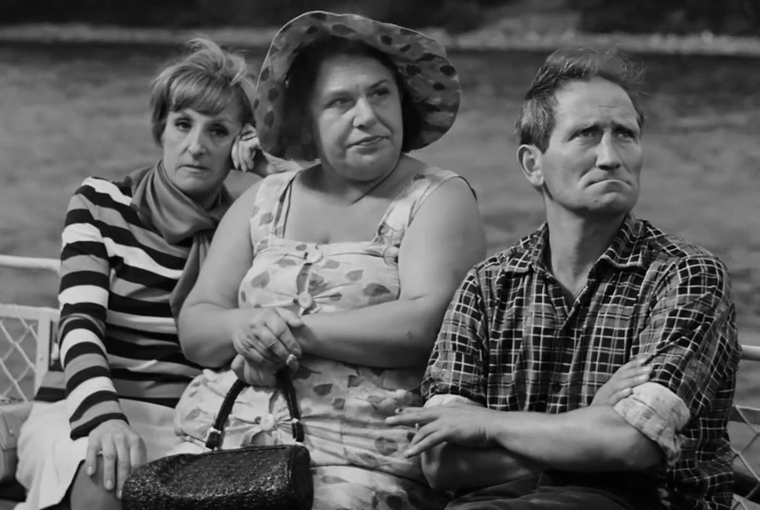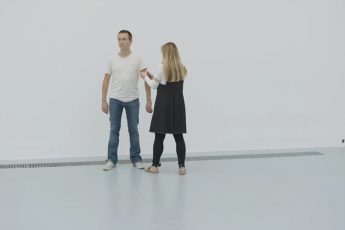Cruising with 20th Century Communism
Marek Piwowski’s The Cruise (Rejs, 1970)
Vol. 104 (April 2020) by Julia Weir
The familiarity of bribery, corruption, and bureaucracy of the Communist state floats back up the river to audiences in Marek Piwowski’s black-and-white film Rejs (1970). Overflowing with the dry, subtle humor of quotidian experiences in Communist Poland, the film is a 67-minute metaphor parodying the Polish United Worker’s Party (Polska Zjednoczona Partia Robotnicza, or PZPR), the political entity which controlled Poland, occasionally under the direction of brutal dictators, between 1945 and 1989. Despite its criticism of Communism, Rejs managed to be released in one of the most sensitive times in modern Polish history. The film whose original production was intended to be a light satire evolved into a heavy parody, but the low-budget, odds-defying creation survived bureaucratic review by both strategic and serendipitous events in its production, governmental approval, and response from anti-Communist audiences. With its star-studded cast and smart score by Wojciech Kilar, who later famously showcased his compositions in The Pianist (2002), Rejs continues to be loved. Perhaps Rejs has withstood the test of time because it sidestepped the bureaucratic review process of a Communist state. Its immortal message remains that 20th century Communism was a farce, but a farce that can be wonderfully portrayed, and decadently appreciated by those whom it was meant to entertain, on the big screen.
Rejs begins with a montage of scenes capturing a commercial cruise down the Vistula River in Poland. On the surface, the images seem to be characteristic of life by the water: a booth for ticket sales, a plank for passage from land to boat, and a deckhand who greets passengers. This opening, however, reveals the disorganization that comes with Communism: the booth displays a large sign that says “No Tickets”, the plank to board the boat is narrow and wobbly, and the deckhand who should be displaying courtesy is enjoying a cigarette on land while high-heeled women struggle towards the entrances with their luggage. Polish Communism’s inherent economic efficiency, inaccessibility for the lower class, and lack of authority, overlaid with Kilar’s ironically upbeat music, sets the tone.
The audience is introduced to a few main characters, including Engineer Mamoń—the Polish surname carries the same meaning as the familiar Hebrew “mammon”; Sidorowski, an older, toothless civil servant; and a nameless stowaway, who manages to eventually control all passenger activity on the boat, despite his unauthorized access. Rejs follows the stowaway’s rise to power and his attempts to cover up his own illegitimacy. The stowaway originally boards the boat by telling the deckhand that he is here “officially”. Without any proof or documentation, another deckhand promptly brings the stowaway to the captain’s quarters, where he is immediately treated with a refreshing, clean shave. The palpable loopholes and favors demonstrate the treatment the stowaway will enjoy for the rest of his stay on the boat.
The stowaway is introduced to the passengers by the captain as “our new friend” who “will be in charge of entertainment, culture, and art” in an administrative meeting, as if this was the general assembly of a political party, not a relaxing summertime voyage down a river. The nervous stowaway, who clearly did not expect this appointment, is embraced by the captain with a Soviet-inspired kiss on each cheek. He goes on to provide his birthdate and hometown to the passengers, and then inexplicably asks, “Are there any questions?” The passengers have been blindly given a leader, this new Director of Entertainment, who is tasked with organizing the activities that will make or break their cruise.
After an enthusiastic—and, for the viewer, hilarious—discussion among the passengers about different voting methods for selecting the activities, including which voting method will be used to select the voting method for the activities, the cruise continues. The manifestation of these activities are symbols of the misfortunes of the average civilian living in the Communist state. Passengers are forced into humiliating trivia contests, gymnastics practices, and singing performances against their will. All the activities are justified by the Director of Entertainment as he and his supporters demand a constant positive attitude from the passengers. As Sidorowski exclaims, “We must arrange a way for there not to be any criticism, only applause and acceptance!”
Perhaps the most memorable scene of Rejs is Engineer Mamoń’s conversation with Sidorowski and his exasperated commentary on the dullness of Polish cinema:
“I don’t like going to the movies and I especially don’t like watching Polish movies. I’m simply bored. Foreign films are good, you know? You can feel them, you know. And Polish movies, Sir, are simply… boring. Nothing happens, Sir. Bad dialogues, very bad dialogues. No plot at all…”
On the surface, Engineer Mamoń’s monologue is perfectly crafted because it is a criticism of the slow-paced Rejs itself, spoken by one of its own characters. On a deeper level, however, this monologue contributes to the same irony that perforates the entire film: as Rejs is a depiction of the totalitarian state in Poland, Engineer Mamoń’s commentary, when unveiled, is actually a criticism of political reality. He goes on to ask Sidorowski: “And who pays for that, sir? You pay, we pay… Society pays!” The monologue ends in frustration as the engineer, who might otherwise earn a wealthy salary, explains that his money is being taken to pay for this societal benefit.
The journey down the Vistula continues with more metaphors for the propaganda, exploitation, and red tape that underlined Communist Poland. The scenes of the passengers’ mandatory activities are interjected with scenes of administrative discussions between the stowaway-turned-leader and his constituents. With every discussion, the Director of Entertainment devolves from timid deceiver to combative authority. His dialogues, which began as anxious, short expressions, turn into audacious, antagonistic orations. The boat-based activities become progressively more ridiculous: a poet and philosopher are coerced into group gymnastics exercises, a senile older man is physically pushed onstage into a trivia competition, and an untalented young man is paired up with a homely woman to sing “Happy Birthday” to the captain.
The final scene of Rejs is somewhat unpredictable, but it also drives home the farcical nature of the film. As if the audience had stepped into some sort of delirium, the closing shot is an outdoor masquerade ball, where every passenger from the movie is dancing in slow motion to the ominously off-pitch tune of the “Happy Birthday” song that carried over from the preceding scene. Characters don oversized paper-mâché masks and theatrical costumes, transfiguring themselves into pirates, clowns, showgirls, Africans, Native American chiefs, and witches. A choir of growing voices continues to repeat the same chorus of “Happy Birthday”, which in Polish translates to “100 years! 100 years! May you live 100 years!”
The singing voices are the passengers who are forced into well-wishing their leader into a long, prosperous life, the same passengers who dance in the masquerade. Their costumes can either be seen positively, as they lightheartedly make fun of the absurd totalitarian state that commands them, or negatively, as they disguise their true freedom into something foreign and unrecognizable in the face of totalitarianism. Either interpretation could be valid and they both conclude Rejs in a similar way: Communism distorts reality and enforces a ludicrous form of life under its authority.
The Choppy Waters of Poland’s Political Climate
Engineer Mamoń’s earlier monologue and the entire film capture the criticism of Communism through elaborate metaphors, filling its screen time with countless ironies often seen during that time in Poland. Perhaps the greatest irony of the film, however, is that the parody was approved by the very Communist state it decries.
Władysław Gomułka led the PZPR as its First Secretary from 1956 to 1970 and policed the country with a reformist version of Communism. Earlier in his career, Gomułka coined the term “the Polish road to socialism”1 and made it the theme of his propaganda and political agenda. Accordingly, cultural achievements in his country were praised and became important in establishing the Polish, not Russian, way of organizing society. During his first years in office, he was seen as an anti-Stalinist and a leader who initiated the thaw to the deep freeze of Soviet influence under Stalin, who had died just three years before Gomułka’s rise to power. He seemed like a promising leader: Poles expected a better life after his political, cultural, and economic liberalization in 1956, but throughout the 1960s he gradually lost hold of his compatriots and government and was considered a conservative, authoritarian figure.2
During the 1960s, censorship increased under Gomułka’s regime as the PZPR was plagued with a series of foreign and domestic issues: “The Israeli victory in the June War of 1967 was used as a pretext for anti-Semitic purges and for the Party to close its ranks. It was also a time of student strikes, suppressed by security forces”.3 Furthermore, the PZPR demonstrated that they could take action against domestic artistic expression. The most significant of their restrictions was the ban of the Warsaw performances of Adam Mickiewicz’s Romantic-era play Dziady at the National Theater.4 This politics of repression culminated in the protests of March 1968, also known historically as the Student’s March. In fact, the proximity of these events to the release of Rejs is so paradigmatic that it is said to be “the first post-March film”5. Born out of frustration with the events unfolding in Poland at that time, Rejs continues to be closely identified with this later period of the Gomułka regime.
Despite socio-political tensions in Poland, the nation did achieve some cultural liberalization throughout the 1960s, so much so that “Polish cinema entered a golden age”6:
Censorship persisted, but it was far less intrusive than before. A range of topics remained off limits and direct criticism of the PZPR or of Communism in general was not allowed, but after Gomułka’s rise to power the media had more latitude in Poland than anywhere else in the Communist world.
While Rejs was released under a seemingly eclectic Communist regime, one that zigzagged between tolerant liberalism and hardline conservatism, the regulation of cultural contributions in Poland was sporadically lax. It was during this regime that film producers actually experienced newfound détente with the Polish ministry of culture and the reviewers of their films: “No longer would the state impose the stylistic requirements of socialist realism, and painters, poets, film-makers, and composers enjoyed vastly more creative freedom”.7 So long as “criticism of the PZPR or of Communism” was not direct, artists seemed to be granted a considerable degree of liberty. If there was ever a moment in the forty-four years of Communist reign in Poland to release a light-hearted, unserious parody of the very state that controlled the film industry’s destiny, it would seem that this was an opportune time.
Treading Water through the Production of “Rejs”
Censorship of the creative arts was relaxed during the 1960s, but that did not mean it had disappeared entirely. Piwowski and Studio Tor, the film organization which funded the production of Rejs, recognized the impending threat of Communist restriction over their film. Indeed, “the post-March climate advised caution”8, so they made adjustments as necessary to their work. Outside of these conscientious adjustments, however, certain factors beyond their control also influenced the production of the film. These circumstances, although commonly considered to be unfortunate events, actually allowed Rejs to become an even more covert satire – one that was so unassuming that it managed to still be released in Communist Poland.
One of these serendipitous circumstances was the noticeably poor production quality in Rejs. Studio Tor was faced with a limited budget for production and the options available for camera equipment at that time were few. The crew was provided with an Arriflex 35mm camera, which was used in the film industry more than 30 years prior to the filming of Rejs. It was such an old, sensitive piece of equipment that it needed to be housed in a soundproof hut to block out the surrounding noise of the ship’s engine during recording. In addition to the archaic camera, the production team of Rejs lacked access to adequate 35mm film stock, not to mention any possibility of using color film. Therefore, they settled for the cheaper black-and-white option.9 Although the production of Rejs experienced a shortage of modern resources due to its low budget, the seemingly adverse circumstances rendered the film appropriately modest, both to bureaucratic reviewers and to the common audience. There were no grandiose scenes, dialogues, or even actors who called much attention to the production, script, or cast. For bureaucratic reviewers, there was little substance to censor. For the common audience, these underwhelming aspects of the film made it more accessible and relatable; their lives were just as boring, slow, and grey as the scenes portrayed in Rejs.
Not only did Piwowski struggle with the financial constraints of his project, but he also had to convince his colleagues of the value of the film itself. Prior to the release of the film, the original artistic director of Studio Tor, Antoni Bohdziewicz, sent a letter of resignation to the minister of culture10:
Perhaps a new director would more easily comprehend Piwowski’s concept and might be able to reason with him… It’s quite possible that I simply don’t understand and don’t value his aspirations, and that despite my warnings and concerns, they might be interesting and valuable.
Bohdziewicz wasn’t necessarily opposed to the production of the film and the reason for his resignation remains uncertain. However, the change in leadership in the organization was yet another obstacle Piwowski needed to overcome.11 Furthermore, the doubt expressed by Bohdziewicz, an esteemed and experienced professional in the film industry, could have been indicative of a greater misinterpretation of Rejs. Bohdziewicz’s voicing of doubt in his letter of resignation raised a valid question: was the film too obscure to be appreciated?
Despite unfavorable factors in production, Piwowski did have some aces up his sleeve which, like his poor-quality production, misled bureaucratic reviewers and captivated viewers: his selection of amateur actors and their onscreen improvisation. If he could not control the budget or the artistic direction from Studio Tor, he at least could decide who appeared in his film and what the nature of his actor’s roles would be. Piwowski selected his actors in a way that blurred the distinction between professional and amateur. Rather than acquiring Polish cinema stars of the time, he generally preferred to cast actors that were less familiar to the general public.12 This allowed him to enlist fresh faces for his cinematographic ideas, disconnected from any preexisting expectations for those actors.
Additionally, among the various factors that made Piwowski a renowned film director was “his talent for capturing on camera ordinary life in Poland and heightening its most absurd features. His films combine minute, subtle observation pertaining to realistic filmmaking with an affinity for creating (often unintentionally, as the director claims) metaphors”.13 Piwowski was able to achieve much of this “subtle observation” by way of improvisation.14 In addition to the benefit of organic acting, improvisation also gave Rejs the appearance of a “quasidocumentary”15 and emphasizes the unstudied approach Piwowski often took with his films. But perhaps the greatest advantage of Piwowski’s improvisation was the constant fluctuation in the dialogues and scenes. Although the script for Rejs was approved, the dialogues that were filmed varied from what had been reviewed by the minister. With governmental approval and equipment allowances, Piwowski had what he needed to begin filming Rejs, and it wasn’t until the minister reviewed the recordings that it could get censored. As if he were following the adage that “it is easier to ask forgiveness than permission,” Piwowski moved forward with Rejs by way of improvisation, even if he knew his entire production might not survive bureaucratic review.
Floating Past Communist Approval
The punctual laxness of the Gomułka regime towards the creative arts contributed to the acceptance of Rejs, but bureaucratic reviewers still paid attention to potential criticism through film. Piwowski and his production team thwarted that hazard by trusting in a few other assets they had on their side. These assets, along with the aforementioned approach of improvisation, included the general dullness of the written script as well as the possibility that those reviewing the film were in fact an ignorant audience, blind to the metaphors he was trying to convey.
The original draft of the script for Rejs totaled 52 typewritten pages and was composed of 48 scenes. The opening scene of the manuscript was written as follows: “Sunny, summertime morning on the Vistula River. A group of four welders ends their night shift.” These first two sentences already set the stage for a script that would satisfy bureaucratic reviewers. The remainder of the script is just as unexciting as the introduction and was so different from the movie that, as film historian Marek Hendrykowski says, one could be referring to two completely different stories. In fact, “not much of what one remembers from the film was even found in the script”16. It is no surprise, then, that such a script was approved for production by bureaucratic reviewers. The written words, without coming alive through the actors, seemed appropriate, and perhaps even dull, but certainly not threatening enough to prohibit production.
One of the most entertaining scenes of Rejs, and one of the most questionable during bureaucratic review, was the game of salonowiec17 played between the stowaway and the philosopher. After the philosopher confesses to the Director of Entertainment that he no longer wishes to participate in the gymnastics exercises, furtively asserting, “I have, maybe, the right to choose,” the Director leans over the ship’s railing, inviting the philosopher to spank him. In this asinine guessing game for two, where only the second player can be the person spanking the first, the Director is spanked by the philosopher and then correctly guesses that the philosopher spanked him. However, when it is the philosopher’s turn to be spanked and he guesses that the Director spanked him, the Director denies with a self-assured “No.” The salonowiec scene is a metaphor for corporal punishment often pursued clandestinely by Communists in Poland during interrogations and provocations. Interestingly, the scene was scrutinized during the review of the film, but eventually included with the original release of Rejs. In the documents preserved from the bureaucratic review of the film, a note was included in the Rejs file dated July 7, 1970, which gave the approval to “carry out all the edits of the film, except for the inclusion of salonowiec scene”. One day later, a note was scribbled below the original approval, which read, “Comrade Minister agreed, on this day, the 8th, to allow the scene”18. According to Hendrykowski, this documentation hints at the air of free-minded liberalism of an understanding regime.
In addition to a script veiled in party-friendly descriptions and dialogue, there was a reasonable possibility that some people who had watched Rejs wouldn’t comprehend the extended metaphor and that some of those people might have been part of the bureaucratic review. Indeed, after one of the screenings during this bureaucratic review process, a comment was made by a reviewer, “Mister Marek, you haven’t produced a comedy. This is simply a regular cruise down the Wisła [the Vistula]!” Even Andrzej Wajda shared a similar sentiment in his doubt that the common audience would understand the metaphor of Rejs19:
As I went to the debut at the Bajka Theater, I assumed that some scenes, which brought me, a professional, satisfaction, would go unnoticed, that they wouldn’t result in applause from the audience. I was in absolute shock. From the first minutes of the film, the screening was accompanied by spontaneous, full, and understanding reactions from the audience, bursts of smiles and clapping.
Piwowski hid the keys to unlock the secrets of this parody so skillfully in the film that it was only accessible to those who were not necessarily looking for them. Those who actively searched Rejs witnessed only the superficial representation of Communism, and effectively only saw a reenactment or documentary-style film. But those who passively enjoyed Rejs saw the deeper symbols of an oppressed life in the darkness of a Communist government which, by the end of the 20th century, was responsible for thousands of deaths and which they themselves experienced: a dictator, his corruption, his propaganda, his injustice, and even his absurdity. Unlike the active viewers, who were often required to watch the film by an authority, those who passively viewed Rejs came to screenings voluntarily and absorbed more out of leisure, not out of obligation. As a result, an entire film unit professionally devoted to the bureaucratic review of films did not see the comedy within Rejs, yet a theater full of ordinary Polish spectators erupted into applause in their first viewing.
“Rejs” Stays Afloat
Piwowski and Studio Tor had many factors to their advantage throughout the production of Rejs. The Gomułka regime was relatively benevolent towards the creative arts, the screenwriters had written a surreptitious script that was approved for production, the low-budget circumstances of production made the film unsuspicious throughout bureaucratic review, and some reviewers didn’t even comprehend the analogy of the movie. Perhaps Engineer Mamoń’s monologue about the boredom in Polish cinema wasn’t intended to be a metaphor for Communism after all, but was in fact the explanation for how Rejs came to be. Rejs was produced humbly. As a result, it flew under the radar of some of its viewers, but stands as a masterful criticism of Communism for others. Rejs captures the ironies, absurdities, and paradoxes of Polish Communism artistically, organically, and subtly. The film made its way to Polish viewers on the day of its debut on October 19th, 1970 and for the past 50 years exemplifies the solidarity of the artist’s world with them, unified against Communism, with all its bad dialogue and lack of plot.
References
- 1.Porter-Szűcs, B. Poland in the Modern World: Beyond Martyrdom, Wiley Blackwell, 2014, p. 237.
- 2.Mazierska, E. Production, Consumption, Power, and Humor in the Films of Marek Piwowski. Journal of Film and Video, 68.2 (2016), 14-28.
- 3.Mazierska 2016, p.15.
- 4.Hendrykowski, M. Rejs. Wydawnictwo Naukowe im. Adama Mickiewicza, 2005, p. 50.
- 5.Hendrykowski 2005, p. 15.
- 6.Porter-Szűcs 2014, pp. 238-239.
- 7.Porter-Szűcs 2014, p. 239.
- 8.Hendrykowski 2005, p. 22.
- 9.Hendrykowski 2005, p. 25.
- 10.Hendrykowski 2005, p. 28.
- 11.Hendrykowski 2005, p. 27.
- 12.Hendrykowski 2005, pp. 31, 34.
- 13.Mazierska 2016, p. 14.
- 14.Mazierska 2016, p. 24.
- 15.Haltof, M. Historical Dictionary of Polish Cinema. Rowman & Littlefield, 2015, p. 46.
- 16.Hendrykowski 2005, p. 19.
- 17.A children’s guessing game in which Player A, with his eyes closed, is spanked by one of the other players in the game and Player A then attempts to identify who spanked him.
- 18.Hendrykowski 2005, p. 21.
- 19.Żmudziński, B. Powaga śmiechu. Wydawnictwo Uniwersytetu Jagiellońskiego, 2007, p. 70.




Great article about ‘Rejs’, my favorite movie with many quotes I use in everyday life 🙂
Bravo to the author for a deep analysis of the comunism in Poland at that time.